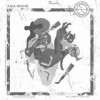Julia Holter, "Tragedy"
 Julia Holter's debut is finally in prime position to reach a wider audience; given the broad appeal of her 2012 album, Ekstasis, to the NPR listening set, Tragedy has been graciously granted a CD pressing. If anything, the pop leanings of Ekstasis reinforce the otherworldliness of Tragedy, which remains a world all its own, conceptually daunting, rich in texture but a difficult entry point into Holter's music.
Julia Holter's debut is finally in prime position to reach a wider audience; given the broad appeal of her 2012 album, Ekstasis, to the NPR listening set, Tragedy has been graciously granted a CD pressing. If anything, the pop leanings of Ekstasis reinforce the otherworldliness of Tragedy, which remains a world all its own, conceptually daunting, rich in texture but a difficult entry point into Holter's music.
Night School (CD) / Leaving (LP/digital)
Tragedy opens with "Try to Make Yourself a Work of Art," which incorporates gently oscillating electronics, mournful strings, and static ambience that rises and falls like an ocean tide. There are occasional swells of guitar drone and Julia Holter's wordless vocals float in and out of the mix like a specter, sometimes indistinguishable from the machines fluttering around it. Halfway into the song, an insistent pulse draws a melodic frame for Holter's words, quoting from Euripedes' Greek play Hippolytus: "Try to make yourself a work of art like me / you can't / see? / only me." Clattering percussion rises up around her voice: "What your mind, so sound and safe, cannot know / this was my plot." In its final minute, the song fades back to gentle ambience, then silence.
If this sounds conceptually ambitious, even a bit overwrought, well, it is. Tragedy is a collection of songs that are such an artistic stretch for Holter, especially for her first full-length LP, that the album is simultaneously charming, captivating, and overreaching. Upon its release last August, the album generated so much hype in underground music circles that it topped Boomkat's end-of-year list, selling out its initial 500-count LP pressing in mere days. (A second pressing this year sold out even faster.) Holter has now released her second album—this year's pop-oriented Ekstasis—and I doubt she will venture back to the grandiose, left-field drama of Tragedy in future years, given her newer album's steps toward melodic accessibility.
As the album continues, "The Falling Age" begins with light-as-air vocals that sound nicked from Julianna Barwick's The Magic Place (one of last year's great overlooked albums) before dissolving into a long stretch of processed strings and Type Records-worthy drone. "Goddess Eyes" is Tragedy's lone pop moment, filtering its most memorable lyric ("I can see you, but my eyes are not allowed to cry") through a Daft Punk-style vocoder, looping it in the background while Holter intones another line from the scene of Hippolytus' fall over and over: "But in your dying you are dear to me." As a doorway into Holter's world, "Goddess Eyes" is flawless, so much so that she reprises it—twice!—on Ekstasis, where it sits well among that album's more conventional songs, but is not quite as perfectly framed as on Tragedy. In a sense, "Goddess Eyes" is Holter doing her best Kate Bush, next to the album's broader Laurie Anderson brushstrokes.
After "Goddess Eyes," Tragedy dives headlong into texture and mood pieces, offering no respite from Holter's artiness, but widening her instrumental palette. "Celebration" adds what sounds like harp (harpsichord?) and some of the most heavenly piano textures I've ever heard, folded into a 12-minute song that remains as much ambience as songcraft. "So Lillies" sees Holter twisting her vocals into loops and layers over a bed of field samples (birdsong, running water, and sampled speech) before a gentle techno pulse and harpsichord take over. "Finale" begins with rich pipe-organ chords before Holter builds up a massive chorus of looped, angelic vocals bit by bit, like an aural Tower of Babel stretching ever heavenward. It's a beautiful ending to a difficult album, incorporating melody and texture through familiar instruments like piano, saxophone, and Holter's fluttering voice.
Music this meticulously crafted and planned out, backed by a concept based around a Greek drama, is tailor-made for listeners to draw lines in the sand. In a behind-the-scenes discussion between Brainwashed writers, one person commented that Tragedy offers "enough seemingly deranged and self-sabotaging artistic decisions to keep [him] entertained." Another disagreed: "No one thinks Holter sounds suspiciously like Enya? A lot of music tows the New Age line but Holter is ridiculous. She should just cover "Sail Away" and be done with it." Either way, given the LP pressing's initial scarcity, I'm willing to bet that Tragedy was talked about more than listened to in 2011. Given its new CD pressing, it deserves listening from the broader audience now discovering her music—love it or hate it.
Samples:



